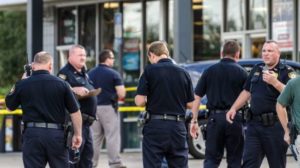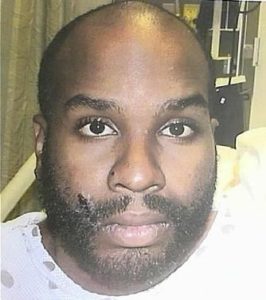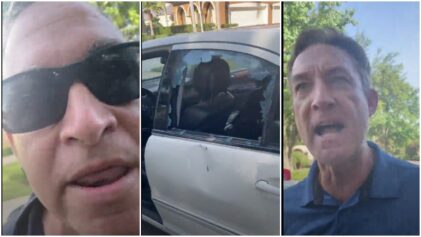When Sean Grant goes on trial this week in Volusia County, Florida, the major charges against him will be two counts of aggravated assault. But in the eyes of his lawyer, Mark O’Mara, race will be a major—but likely unspoken—presence in the courtroom.
Grant took a sandwich and a beer from a Racetrac gas station on October 21, 2013 without paying for them. That fact is not in dispute. Grant admits to the shoplifting, which he said was stupid and inexcusable.
But in response to the crime, a police officer who was inside of the Racetrac exited the store and fired a volley of four or five shots inside Grant’s Honda. One bullet shattered Grant’s wrist, another hit him in the cheek and another lodged in the chest of Grant’s acquaintance, William Kitchen, just a centimeter from his aorta. Kitchen survived, but the bullet is still in his chest—too close to his heart to risk removing it.
The officer, Joshua Santos of the Deland Police Department, said he fired at Grant because he thought the car was headed toward him and his partner. Grant, who was 27 at the time, said he saw the gun pointed at him and was just trying to get out of the parking lot. Kitchen, who is white, confirms Grant’s account. So do the skid marks showing that his car accelerated in a left turn away from the officers.
But O’Mara said he doesn’t think Officer Santos would have even taken the gun out of his holster if Grant wasn’t Black.
It is the kind of case that tests whether the American legal system is able to handle common sense and police overreaction when a young Black male is on trial. It is the kind of case that draws even extra scrutiny in this age of Eric Garner and Michael Brown.
“If Sean Grant was white with a sweater wrapped around his neck, that gun is not coming out,” O’Mara said in an interview with Atlanta Blackstar. “I don’t see it. That gun does not come out. That gun was out of that holster before that car is going forward. There’s no other fact scenario that makes sense. Why the hell was he taking a gun out because a guy stole a sandwich? And I don’t care he’s trying to get away. You still can’t pull a gun. But he pulled a gun because he’s okay with pulling a gun under the facts that he saw.”
O’Mara understands that in the eyes of most of the public, which got accustomed to watching him over the course of months vigorously defend George Zimmerman for killing 17-year-old Trayvon Martin inside a Florida subdivision, he’s an unlikely figure to be pushing the idea of racial bias against Black males. But he says that’s because most of the public doesn’t know the majority of the clients he’s defended over more than 30 years as a defense lawyer have been Black males.
During those years of watching the system up close, he knows there are many things that happen in a courtroom when the defendant is a Black man. And in the case of Grant, when the trial begins on Monday, O’Mara said he knows what the Deland jury will be thinking.
“They [the prosecutors] are not going to say ‘Black kid.’ They don’t need to say ‘Black kid’ to a Deland, mostly white, mostly country jury,” O’Mara predicted. “They’re going to sit back and say this cop saw a threat, he saw the car aiming towards him, this guy is a criminal because he stole a sandwich and the cop did what he had to do.”
After what he did to Trayvon in the Zimmerman trial, O’Mara sees the irony of him being disturbed that his client in this case will be seen as guilty because of the shoplifting.
“I got blamed for blaming Trayvon in Zimmerman case,” he said. “I tell you right now, you know it as well as I do [that Grant will be blamed]. And I’m not a bleeding heart liberal. I just live my life here and I know all this stuff. When people hassle me for representing Zimmerman, I remind them of my pedigree. I’ve been doing this for 32 years. I’ve got more death penalty cases then most people around. I’ve represented a disproportionate amount of young Black males because there’s a disproportionate amount of young Black males in the system. I know my pedigree. But they are going to look at that jury and say, ‘Just look at the fact [of what Grant did].”

“There’s not an the active racism in system there was in the 1950s and 60s,” O’Mara said. “In the 50s and 60s you can look at statutes that said Blacks shall not use this bathroom, this water fountain. We had statutorily endorsed racism. Now the racism that exists is more subtle. By subtle I mean it’s more subconscious. That’s why the studies you look at show that everybody looks at young Black males differently, as more suspicious. Walking down the street, doing whatever. Sociological studies done of people looking at pictures show they react differently when it’s a young Black male than when it’s a young white male.
“So I’m not saying this guy decided, ‘I get to kill a Black kid today,” O’Mara continued. “I’m not saying it’s an affirmative frontal lobe decision. But I will tell you it was a limbic system decision that had him pull out that gun because Sean was Black. That’s my thought. I’ve done this a long time. This is my life. This isn’t just a hobby. This is what I do.”
In addition to the two counts of aggravated assault on the law enforcement officers with a deadly weapon (his car), Grant is also charged one count of retail theft and one count of leaving the scene of a crash involving damage—when he hurriedly backed up before he sped off to get away from Santos’ bullets, Grant’s Honda hit the back of another car that was also exiting a parking space in front of the Racetrac in Deland.
After the shooting, the case was investigated by the Florida Department of Law Enforcement, which cleared Santos, finding “that the outcome of the action taken by Officer Santos was consistent with the physical evidence and overall testimony.”
In addition, the office of State Attorney R.J. Larizza reviewed the case and decided that no action, such as charges against Santos, was warranted.
“They felt the shooting was appropriate, so I can’t help what a defense attorney says,” DeLand Police Chief Bill Ridgway told the Daytona Beach News-Journal. “We don’t specifically train to shoot at moving vehicles. In fact, we discourage it unless it’s a last resort, which this was.”
Kitchen, the white man who happened to be getting a lift from Grant as a favor, filed a federal lawsuit in December, accusing the city of DeLand, the DeLand Police Department and Officer Santos of violating his Fourth, Fifth and 14th Amendment rights.
Kitchen’s lawsuit states that the tires on the Honda were always turned in a path leading out of the gas station.
Grant currently isn’t able to talk to the police or the city because he was charged with a felony. So his lawsuit can come only if O’Mara is able to get him acquitted.
“They have to defend the cop, that’s why they charged him [Grant],” O’Mara said. “This was an overreaction with the use of a firearm. And now the city is at risk for having put a bullet in a guy’s chest who is a passenger and another bullet ripping through a guy’s wrist and a cheek. So they’re going to protect their officers by charging a felony. They’re going to trial because they’d much rather have a jury say let him go then admit that it’s a bad shooting. They’re going to blame everything they can on Sean Grant although the only thing he did was steal a sandwich and a beer.”
O’Mara said this is the same police department that a month earlier made the national news when DeLand Police Officer James Harris killed a Black man, 38-year-old Marlon Robert Brown, by running him over in a field when the suspect tried to flee on foot after police attempted to pull him over for a seat belt violation. The video shows Harris drive around his fellow officers and speed towards Brown, nailing him with his car.
“I think he’s underneath the [expletive] car,” one of the officers can be heard saying in the video.
O’Mara also pointed out that Santos’ partner, officer Julian Rioz, didn’t even take his gun out of his holster.
O’Mara said his client is a “great kid.”
“He has no prior criminal record, he was working a good job in a tech type industry, engaged to a real nice lady named Dominique,” O’Mara said. “I’ve done this for 32 years and there’s a percentage of my clientele that have been through it before, and there’s a percentage of my clientele that live their lives being my clients. Sean Grant is not him. Sean was hanging out, a good guy, has a good job. He actually had this guy in the backseat because he met a buddy of his and this guy’s car broke down and he was giving the guy a ride. He did not deserve to get shot for stealing a sandwich and a beer. He didn’t deserve to get prosecuted because the cop overreacted. None of this should have happened.”



